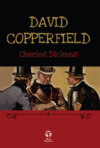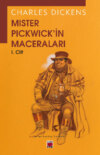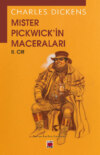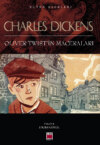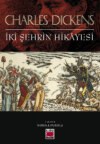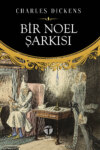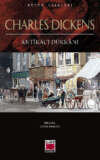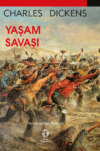Kitabı oku: «Oliver Twist. Volume 3 of 3», sayfa 8
CHAPTER XLIV
THE APPOINTMENT KEPT
The church clocks chimed three quarters past eleven as two figures emerged on London Bridge. One, which advanced with a swift and rapid step, was that of a woman, who looked eagerly about her as though in quest of some expected object; the other figure was that of a man, who slunk along in the deepest shadow he could find, and at some distance accommodated his pace to hers, stopping when she stopped, and, as she moved again, creeping stealthily on, but never allowing himself, in the ardour of his pursuit, to gain upon her footsteps. Thus they crossed the bridge from the Middlesex to the Surrey shore, when the woman, apparently disappointed in her anxious scrutiny of the foot-passengers, turned back. The movement was sudden, but he who watched her was not thrown off his guard by it, for shrinking into one of the recesses which surmount the piers of the bridge, and leaning over the parapet the better to conceal his figure, he suffered her to pass by on the opposite pavement, and when she was about the same distance in advance as she had been before, he slipped quietly down and followed her again. At nearly the centre of the bridge she stopped. The man stopped too.
It was a very dark night. The day had been unfavourable, and at that hour and place there were few people stirring. Such as there were hurried quickly past, very possibly without seeing, but certainly without noticing, either the woman or the man who kept her in view. Their appearance was not calculated to attract the importunate regards of such of London’s destitute population, as chanced to take their way over the bridge that night in search of some cold arch or doorless hovel wherein to lay their heads; they stood there in silence, neither speaking nor spoken to by any one who passed.
A mist hung over the river, deepening the red glare of the fires that burnt upon the small craft moored off the different wharfs, and rendering darker and more indistinct the mirky buildings on the banks. The old smoke-stained storehouses on either side rose heavy and dull from the dense mass of roofs and gables, and frowned sternly upon water too black to reflect even their lumbering shapes. The tower of old Saint Saviour’s church, and the spire of Saint Magnus, so long the giant-warders of the ancient bridge, were visible in the gloom; but the forest of shipping below bridge, and the thickly scattered spires of churches above, were nearly all hidden from the sight.
The girl had taken a few restless turns to and fro – closely watched meanwhile by her hidden observer – when the heavy bell of St. Paul’s tolled for the death of another day. Midnight had come upon the crowded city. The palace, the night-cellar, the jail, the madhouse; the chambers of birth and death, of health and sickness; the rigid face of the corpse and the calm sleep of the child – midnight was upon them all.
The hour had not struck two minutes, when a young lady, accompanied by a grey-haired gentleman, alighted from a hackney-carriage within a short distance of the bridge, and, having dismissed the vehicle, walked straight towards it. They had scarcely set foot upon its pavement when the girl started, and immediately made towards them.
They walked onwards, looking about them with the air of persons who entertained some very slight expectation which had little chance of being realised, when they were suddenly joined by this new associate. They halted with an exclamation of surprise, but suppressed it immediately, for a man in the garments of a countryman came close up – brushed against them, indeed – at that precise moment.
“Not here,” said Nancy hurriedly. “I am afraid to speak to you here. Come away – out of the public road – down the steps yonder.”
As she uttered these words, and indicated with her hand the direction in which she wished them to proceed, the countryman looked round, and roughly asking what they took up the whole pavement for, passed on.
The steps to which the girl had pointed were those which, on the Surrey bank, and on the same side of the bridge as Saint Saviour’s church, form a landing-stairs from the river. To this spot the man bearing the appearance of a countryman hastened unobserved; and after a moment’s survey of the place, he began to descend.
These stairs are a part of the bridge; they consist of three flights. Just below the end of the second, going down, the stone wall on the left terminates in an ornamental pier, or pedestal, facing towards the Thames. At this point the lower steps widen, so that a person turning that angle of the wall is necessarily unseen by any others on the stairs who chance to be above him, if only a step. The countryman looked hastily round when he reached this point, and as there seemed no better place of concealment, and the tide being out there was plenty of room, he slipped aside, with his back to the pier, and there waited, pretty certain that they would come no lower, and that even if he could not hear what was said, he could follow them again with safety.
So tardily stole the time in this lonely place, and so eager was the spy to penetrate the motives of an interview so different from what he had been led to expect, that he more than once gave the matter up for lost, and persuaded himself either that they had stopped far above, or resorted to some entirely different spot to hold their mysterious conversation. He was on the very point of emerging from his hiding-place, and regaining the road above, when he heard the sound of footsteps, and directly afterwards of voices, almost close at his ear.
He drew himself straight upright against the wall, and, scarcely breathing, listened attentively.
“This is far enough,” said a voice, which was evidently that of the gentleman. “I will not suffer this young lady to go any further. Many people would have distrusted you too much to have come even so far, but you see I am willing to humour you.”
“To humour me!” cried the voice of the girl whom he had followed. “You’re considerate, indeed, sir. To humour me! Well, well, it’s no matter.”
“Why, for what,” said the gentleman in a kinder tone, “for what purpose can you have brought us to this strange place? Why not have let me speak to you above there, where it is light, and there is something stirring, instead of bringing us to this dark and dismal hole?”
“I told you before,” replied Nancy, “that I was afraid to speak to you there. I don’t know why it is,” said the girl, shuddering, “but I have such a fear and dread upon me to-night that I can hardly stand.”
“A fear of what?” asked the gentleman, who seemed to pity her.
“I scarcely know of what,” replied the girl. “I wish I did. Horrible thoughts of death, and shrouds with blood upon them, and a fear that has made me burn as if I was on fire, have been upon me all day. I was reading a book to-night to wile the time away, and the same things came into the print.”
“Imagination,” said the gentleman, soothing her.
“No imagination,” replied the girl in a hoarse voice. “I’ll swear I saw ‘coffin’ written in every page of the book in large black letters, – ay, and they carried one close to me in the streets to-night.”
“There is nothing unusual in that,” said the gentleman. “They have passed me often.”
“Real ones,” rejoined the girl. “This was not.”
There was something so uncommon in her manner that the flesh of the concealed listener crept as he heard the girl utter these words, and the blood chilled within him. He had never experienced a greater relief than hearing the sweet voice of the young lady as she begged her to be calm, and not allow herself to become the prey of such fearful fancies.
“Speak to her kindly,” said the young lady to her companion. “Poor creature! She seems to need it.”
“Your haughty religious people would have held their heads up to see me as I am to-night, and preached of flames and vengeance,” cried the girl. “Oh, dear lady, why ar’n’t those who claim to be God’s own folks as gentle and as kind to us poor wretches as you, who, having youth and beauty and all that they have lost, might be a little proud instead of so much humbler!”
“Ah!” said the gentleman, “a Turk turns his face, after washing it well, to the East when he says his prayers; these good people, after giving their faces such a rub with the World as takes the smiles off, turn with no less regularity to the darkest side of Heaven. Between the Mussulman and the Pharisee, commend me to the first.”
These words appeared to be addressed to the young lady, and were perhaps uttered with the view of affording Nancy time to recover herself. The gentleman shortly afterwards addressed himself to her.
“You were not here last Sunday night,” he said.
“I couldn’t come,” replied Nancy; “I was kept by force.”
“By whom?”
“Bill – Him that I told the young lady of before.”
“You were not suspected of holding any communication with anybody on the subject which has brought us here to-night, I hope?” asked the old gentleman anxiously.
“No,” replied the girl, shaking her head. “It’s not very easy for me to leave him unless he knows why; I couldn’t have seen the lady when I did, but that I gave him a drink of laudanum before I came away.”
“Did he awake before you returned?” inquired the gentleman.
“No; and neither he nor any of them suspect me.”
“Good,” said the gentleman. “Now listen to me.”
“I am ready,” replied the girl, as he paused for a moment.
“This young lady,” the gentleman began, “has communicated to me and some other friends who can be safely trusted, what you told her nearly a fortnight since. I confess to you that I had doubts at first whether you were to be implicitly relied upon, but now I firmly believe you are.”
“I am,” said the girl earnestly.
“I repeat that I firmly believe it. To prove to you that I am disposed to trust you, I tell you without reserve, that we propose to extort the secret, whatever it may be, from the fears of this man Monks. But if – if – ” said the gentleman, “he cannot be secured, or, if secured, cannot be acted upon as we wish, you must deliver up the Jew.”
“Fagin!” cried the girl, recoiling.
“That man must be delivered up by you,” said the gentleman.
“I will not do it – I will never do it,” replied the girl. “Devil that he is, and worse than devil as he has been to me, I will never do that.”
“You will not?” said the gentleman, who seemed fully prepared for this answer.
“Never!” returned the girl.
“Tell me why?”
“For one reason,” rejoined the girl firmly, “for one reason, that the lady knows and will stand by me in, I know she will, for I have her promise; and for this other reason besides, that, bad life as he has led, I have led a bad life too; there are many of us who have kept the same courses together, and I’ll not turn upon them, who might – any of them – have turned upon me, but didn’t, bad as they are.”
“Then,” said the gentleman quickly, as if this had been the point he had been aiming to attain – “put Monks into my hands, and leave him to me to deal with.”
“What if he turns against the others?”
“I promise you that in that case, if the truth is forced from him, there the matter will rest; there must be circumstances in Oliver’s little history which it would be painful to drag before the public eye, and if the truth is once elicited, they shall go scot free.”
“And if it is not?” suggested the girl.
“Then,” pursued the gentleman, “this Jew shall not be brought to justice without your consent. In such a case I could show you reasons, I think, which would induce you to yield it.”
“Have I the lady’s promise for that?” asked the girl eagerly.
“You have,” replied Rose. “My true and faithful pledge.”
“Monks would never learn how you knew what you do?” said the girl, after a short pause.
“Never,” replied the gentleman. “The intelligence should be so brought to bear upon him, that he could never even guess.”
“I have been a liar, and among liars from a little child,” said the girl after another interval of silence, “but I will take your words.”
After receiving an assurance from both that she might safely do so, she proceeded in a voice so low that it was often difficult for the listener to discover even the purport of what she said, to describe by name and situation the public-house whence she had been followed that night. From the manner in which she occasionally paused, it appeared as if the gentleman were making some hasty notes of the information she communicated. When she had thoroughly explained the localities of the place, the best position from which to watch it without exciting observation, and the night and hour on which Monks was most in the habit of frequenting it, she seemed to consider a few moments for the purpose of recalling his features and appearance more forcibly to her recollection.
“He is tall,” said the girl, “and a strongly made man, but not stout; he has a lurking walk, and as he walks, constantly looks over his shoulder, first on one side and then on the other. Don’t forget that, for his eyes are sunk in his head so much deeper than any other man’s, that you might almost tell him by that alone. His face is dark, like his hair and eyes, but, although he can’t be more than six or eight and twenty, withered and haggard. His lips are often discoloured and disfigured with the marks of teeth, for he has desperate fits, and sometimes even bites his hands and covers them with wounds – why did you start?” said the girl, stopping suddenly.
The gentleman replied in a hurried manner that he was not conscious of having done so, and begged her to proceed.
“Part of this,” said the girl, “I’ve drawn out from other people at the house I tell you of, for I have only seen him twice, and both times he was covered up in a large cloak. I think that’s all I can give you to know him by. Stay though,” she added. “Upon his throat, so high that you can see a part of it below his neckerchief when he turns his face, there is – ”
“A broad red mark, like a burn or scald,” cried the gentleman.
“How’s this!” said the girl. “You know him!”
The young lady uttered a cry of extreme surprise, and for a few moments they were so still that the listener could distinctly hear them breathe.
“I think I do,” said the gentleman, breaking silence. “I should by your description. We shall see. Many people are singularly like each other, though, – it may not be the same.”
As he expressed himself to this effect with assumed carelessness, he took a step or two nearer the concealed spy, as the latter could tell from the distinctness with which he heard him mutter, “It must be he!”
“Now,” he said, returning, so it seemed by the sound, to the spot where he had stood before, “you have given us most valuable assistance, young woman, and I wish you to be the better for it. What can I do to serve you?”
“Nothing,” replied Nancy.
“You will not persist in saying that,” rejoined the gentleman with a voice and emphasis of kindness that might have touched a much harder and more obdurate heart. “Think now. Tell me.”
“Nothing, sir,” rejoined the girl, weeping. “You can do nothing to help me. I am past all hope, indeed.”
“You put yourself beyond its pale,” said the gentleman; “the past has been a dreary waste with you, of youthful energies mis-spent, and such priceless treasures lavished as the Creator bestows but once and never grants again, but for the future you may hope. I do not say that it is in our power to offer you peace of heart and mind, for that must come as you seek it; but a quiet asylum, either in England, or, if you fear to remain here, in some foreign country, it is not only within the compass of our ability but our most anxious wish to secure to you. Before the dawn of morning, before this river wakes to the first glimpse of daylight, you shall be placed as entirely beyond the reach of your former associates, and leave as utter an absence of all traces behind you, as if you were to disappear from the earth this moment. Come. I would not have you go back to exchange one word with any old companion, or take one look at any old haunt, or breathe the very air which is pestilence and death to you. Quit them all, while there is time and opportunity.”
“She will be persuaded now,” cried the young lady. “She hesitates, I am sure.”
“I fear, not, my dear,” said the gentleman.
“No sir, I do not,” replied the girl after a short struggle. “I am chained to my old life. I loathe and hate it now, but I cannot leave it. I must have gone too far to turn back, – and yet I don’t know, for if you had spoken to me so some time ago, I should have laughed it off. But,” she said, looking hastily round, “this fear comes over me again. I must go home.”
“Home!” repeated the young lady, with great stress upon the word.
“Home, lady,” rejoined the girl. “To such a home as I have raised for myself with the work of my whole life. Let us part. I shall be watched or seen. Go, go. If I have done you any service, all I ask is, that you leave me, and let me go my way alone.”
“It is useless,” said the gentleman with a sigh. “We compromise her safety perhaps by staying here. We may have detained her longer than she expected already.”
“Yes, yes,” urged the girl. “You have.”
“What,” cried the young lady, “can be the end of this poor creature’s life?”
“What!” repeated the girl. “Look before you, lady. Look at that dark water. How many times do you read of such as we who spring into the tide, and leave no living thing to care for or bewail them. It may be years hence, or it may be only months, but I shall come to that at last.”
“Do not speak thus, pray,” returned the young lady, sobbing.
“It will never reach your ears, dear lady, and God forbid such horrors should!” – replied the girl. “Good night, good night.”
The gentleman turned away.
“This purse,” cried the young lady. “Take it for my sake, that you may have some resource in an hour of need and trouble.”
“No, no,” replied the girl. “I have not done this for money. Let me have that to think of. And yet – give me something that you have worn: I should like to have something – no, no, not a ring – your gloves or handkerchief – anything that I can keep as having belonged to you, sweet lady. There. Bless you – God bless you. Good night, good night.”
The violent agitation of the girl, and the apprehension of some discovery which would subject her to ill-usage and violence, seemed to determine the gentleman to leave her as she requested. The sound of retreating footsteps were audible, and the voices ceased.
The two figures of the young lady and her companion soon afterwards appeared upon the bridge. They stopped at the summit of the stairs.
“Hark!” cried the young lady, listening. “Did she call! I thought I heard her voice.”
“No, my love,” replied Mr. Brownlow, looking sadly back. “She has not moved, and will not till we are gone.”
Rose Maylie lingered, but the old gentleman drew her arm through his, and led her with gentle force away. As they disappeared, the girl sunk down nearly at her full length upon one of the stone stairs, and vented the anguish of her heart in bitter tears.
After a time she rose, and with feeble and tottering steps ascended to the street. The astonished listener remained motionless on his post for some minutes afterwards, and having ascertained with many cautious glances round him that he was again alone, crept slowly from his hiding-place, and returned, stealthily and in the shade of the wall, in the same manner as he had descended.
Peeping out more than once when he reached the top, to make sure that he was unobserved, Noah Claypole darted away at his utmost speed, and made for the Jew’s house as fast as his legs would carry him.
CHAPTER XLV
FATAL CONSEQUENCES
It was nearly two hours before daybreak – that time which in the autumn of the year may be truly called the dead of night, when the streets are silent and deserted, when even sound appears to slumber, and profligacy and riot have staggered home to dream – it was at this still and silent hour that the Jew sat watching in his old lair, with face so distorted and pale, and eyes so red and bloodshot, that he looked less like a man than like some hideous phantom, moist from the grave, and worried by an evil spirit.
He sat crouching over a cold hearth, wrapped in an old torn coverlet, with his face turned towards a wasting candle that stood upon a table by his side. His right hand was raised to his lips, and as, absorbed in thought, he bit his long black nails, he disclosed among his toothless gums a few such fangs as should have been a dog’s or rat’s.
Stretched upon a mattress on the floor lay Noah Claypole fast asleep. Towards him the old man sometimes directed his eyes for an instant, then brought them back again to the candle, which, with long-burnt wick drooping almost double, and hot grease falling down in clots upon the table, plainly showed that his thoughts were busy elsewhere.
Indeed they were. Mortification at the overthrow of his notable scheme, hatred of the girl who had dared to palter with strangers, an utter distrust of the sincerity of her refusal to yield him up, bitter disappointment at the loss of his revenge on Sikes, the fear of detection and ruin and death, and a fierce and deadly rage kindled by all, – these were the passionate considerations that following close upon each other with rapid and ceaseless whirl shot through the brain of Fagin, as every evil thought and blackest purpose lay working at his heart.
He sat without changing his attitude in the least, or appearing to take the smallest heed of time, until his quick ear seemed to be attracted by a footstep in the street.
“At last,” muttered the Jew, wiping his dry and fevered mouth. “At last.”
The bell rang gently as he spoke. He crept up stairs to the door, and presently returned accompanied by a man muffled to the chin, who carried a bundle under one arm. Sitting down and throwing back his outer coat, the man displayed the burly frame of Sikes.
“There,” he said, laying the bundle on the table. “Take care of that, and do the most you can with it. It’s been trouble enough to get; I thought I should have been here three hours ago.”
Fagin laid his hand upon the bundle, and locking it in the cupboard, sat down again without speaking. But he did not take his eyes off the robber for an instant during this action, and now that they sat over against each other face to face, he looked fixedly at him, with his lips quivering so violently, and his face so altered by the emotions which had mastered him, that the housebreaker involuntarily drew back his chair, and surveyed him with a look of real affright.
“Wot now?” cried Sikes. “Wot do you look at a man so for? – Speak, will you?”
The Jew raised his right hand, and shook his trembling forefinger in the air, but his passion was so great, that the power of speech was for the moment gone.
“Damme!” said Sikes, feeling in his breast with a look of alarm. “He’s gone mad. I must look to myself here.”
“No, no,” rejoined Fagin, finding his voice. “It’s not – you’re not the person, Bill. I’ve no – no fault to find with you.”
“Oh, you haven’t, haven’t you?” said Sikes, looking sternly at him, and ostentatiously passing a pistol into a more convenient pocket. “That’s lucky – for one of us. Which one that is, don’t matter.”
“I’ve got that to tell you, Bill,” said the Jew, drawing his chair nearer, “will make you worse than me.”
“Aye?” returned the robber with an incredulous air. “Tell away. Look sharp, or Nance will think I’m lost.”
“Lost!” cried Fagin. “She has pretty well settled that in her own mind already.”
Sikes looked with an aspect of great perplexity into the Jew’s face, and reading no satisfactory explanation of the riddle there, clenched his coat collar in his huge hand, and shook him soundly.
“Speak, will you!” he said; “or if you don’t, it shall be for want of breath. Open your mouth and say wot you’ve got to say in plain words. Out with it, you thundering old cur, out with it.”
“Suppose that lad that’s lying there – ” Fagin began.
Sikes turned round to where Noah was sleeping as if he had not previously observed him. “Well,” he said, resuming his former position.
“Suppose that lad,” pursued the Jew, “was to peach – blow upon us all – first seeking out the right folks for the purpose, and then having a meeting with ’em in the street to paint our likenesses, describe every mark that they might know us by, and the crib where we might be most easily taken. Suppose he was to do all this, and besides to blow upon a plant we’ve all been in, more or less – of his own fancy; not grabbed, trapped, tried, earwigged by the parson and brought to it on bread and water, – but of his own fancy; to please his own taste; stealing out at nights to find those most interested against us, and peaching to them. Do you hear me?” cried the Jew, his eyes flashing with rage. “Suppose he did all this, what then?”
“What then!” replied Sikes with a tremendous oath. “If he was left alive till I came, I’d grind his skull under the iron heel of my boot into as many grains as there are hairs upon his head.”
“What if I did it!” cried the Jew almost in a yell. “I, that know so much, and could hang so many besides myself!”
“I don’t know,” replied Sikes, clenching his teeth and turning white at the mere suggestion. “I’d do something in the jail that ’ud get me put in irons; and if I was tried along with you, I’d fall upon you with them in the open court, and beat your brains out afore the people. I should have such strength,” muttered the robber, poising his brawny arm, “that I could smash your head as if a loaded waggon had gone over it.”
“You would.”
“Would I!” said the housebreaker. “Try me.”
“If it was Charley, or the Dodger, or Bet, or – ”
“I don’t care who,” replied Sikes impatiently. “Whoever it was, I’d serve them the same.”
Fagin again looked hard at the robber, and motioning him to be silent, stooped over the bed upon the floor, and shook the sleeper to rouse him. Sikes leant forward in his chair, looking on with his hands upon his knees as if wondering much what all this questioning and preparation was to end in.
“Bolter, Bolter. Poor lad!” said Fagin, looking up with an expression of devilish anticipation, and speaking slowly and with marked emphasis. “He’s tired – tired with watching for her so long, – watching for her, Bill.”
“Wot d’ye mean?” asked Sikes, drawing back.
The Jew made no answer, but bending over the sleeper again, hauled him into a sitting posture. When his assumed name had been repeated several times, Noah rubbed his eyes, and giving a heavy yawn looked sleepily about him.
“Tell me that again – once again, just for him to hear,” said the Jew, pointing to Sikes as he spoke.
“Tell yer what?” asked the sleepy Noah, shaking himself pettishly.
“That about – Nancy,” said the Jew, clutching Sikes by the wrist, as if to prevent his leaving the house before he had heard enough. “You followed her?”
“Yes.”
“To London Bridge?”
“Yes.”
“Where she met two people?”
“So she did.”
“A gentleman, and a lady that she had gone to of her own accord before, who asked her to give up all her pals, and Monks first, which she did – and to describe him, which she did – and to tell her what house it was that we meet at and go to, which she did – and where it could be best watched from, which she did – and what time the people went there, which she did. She did all this. She told it all every word without a threat, without a murmur – she did – didn’t she?” cried the Jew, half mad with fury.
“All right,” replied Noah, scratching his head. “That’s just what it was!”
“What did they say about last Sunday?” demanded the Jew.
“About last Sunday!” replied Noah, considering. “Why, I told yer that before.”
“Again. Tell it again!” cried Fagin, tightening his grasp on Sikes, and brandishing his other hand aloft as the foam flew from his lips.
“They asked her,” said Noah, who, as he grew more wakeful, seemed to have a dawning perception who Sikes was, “they asked her why she didn’t come last Sunday as she promised. She said she couldn’t – ”
“Why – why?” interrupted the Jew triumphantly. “Tell him that.”
“Because she was forcibly kept at home by Bill, the man she had told them of before,” replied Noah.
“What more of him?” cried the Jew. “What more of the man she had told them of before? Tell him that, tell him that.”
“Why, that she couldn’t very easily get out of doors unless he knew where she was going to,” said Noah; “and so the first time she went to see the lady, she – ha! ha! ha! it made me laugh when she said it, that it did – she gave him a drink of laudanum.”
“Hell’s fire!” cried Sikes, breaking fiercely from the Jew. “Let me go!”
Flinging the old man from him, he rushed from the room, and darted wildly and furiously up the stairs.
“Bill, Bill!” cried the Jew, following him hastily. “A word. Only a word.”
The word would not have been exchanged, but that the housebreaker was unable to open the door, on which he was expending fruitless oaths and violence when the Jew came panting up.
“Let me out,” said Sikes. “Don’t speak to me – it’s not safe. Let me out, I say.”
“Hear me speak a word,” rejoined the Jew, laying his hand upon the lock, “You won’t be – ”
“Well,” replied the other.
“You won’t be – too – violent, Bill?” whined the Jew.
The day was breaking, and there was light enough for the men to see each other’s faces. They exchanged one brief glance; there was a fire in the eyes of both which could not be mistaken.
“I mean,” said Fagin, showing that he felt all disguise was now useless, “not too violent for safety. Be crafty, Bill, and not too bold.”
Sikes made no reply, but, pulling open the door of which the Jew had turned the lock, dashed into the silent streets.
Without one pause or moment’s consideration, without once turning his head to the right or left or raising his eyes to the sky or lowering them to the ground but looking straight before him with savage resolution, his teeth so tightly compressed that the strained jaw seemed starting through his skin, the robber held on his headlong course, nor muttered a word, nor relaxed a muscle, until he reached his own door. He opened it softly with a key, strode lightly up the stairs, and entering his own room, double-locked the door, and lifting a heavy table against it, drew back the curtain of the bed.

